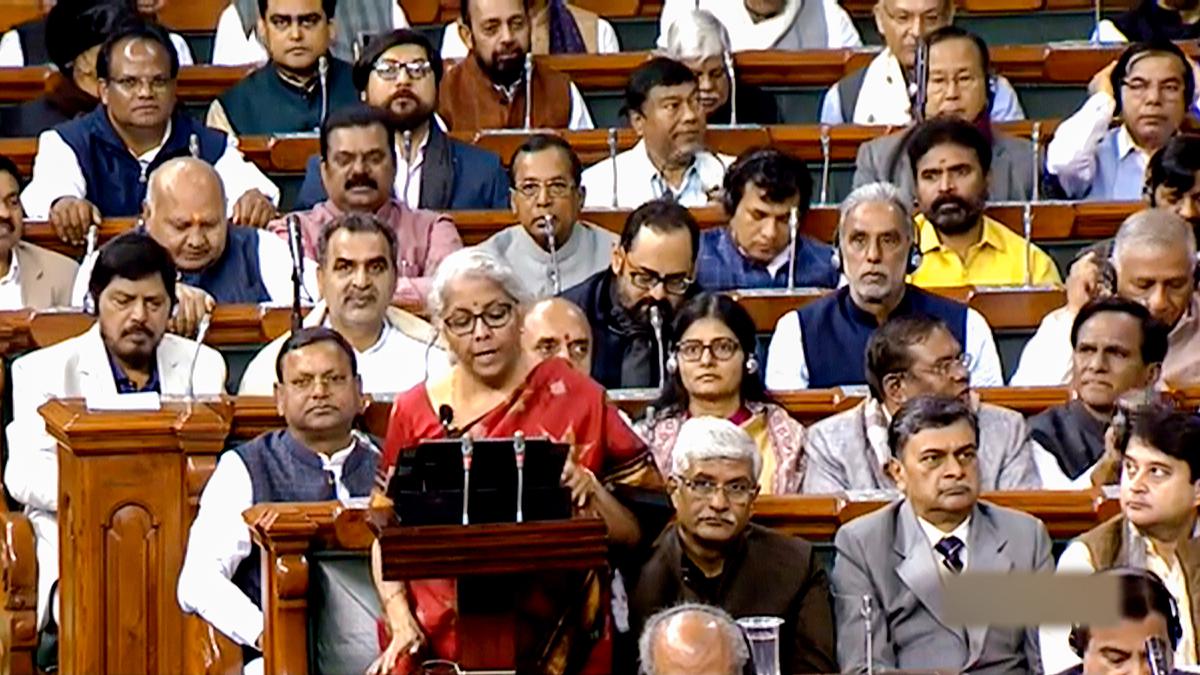Union Budget 2023-24 Highlights | Income tax rebate limit increased to ₹7 lakh crore; Railways accorded highest-ever capital outlay

Union Finance Minister Nirmala Sitharaman presents the Union Budget 2023-24 in the Lok Sabha, in New Delhi on February 1, 2023
| Photo Credit: PTI
Announcing its last full budget before the 2024 elections, the NDA government focused on a slew of measures that expanded Capital Expenditure spending and tied in various priorities including Green Growth, Youth Power and Inclusive Development. This was also accompanied by major tax announcements for the salaried class, with changes in tax slabs and a clear intention to shift to the new tax regime.
The Union Finance Minister highlighted that the current year’s economic growth is estimated to be at 7%, “highest among all the major economies.” Finally, with regards to the fiscal deficit, she retained it to the target of 6.4% in the revised estimate for FY2022-23 and reduced it to 5.9% for the next fiscal. Fiscal deficit would be brought down to below 4.5% by 2025-26, Ms. Sitharaman said.
Here are the key highlights from today budget speech:
Major announcements:
> Finance Minister Nirmala Sitharaman upped the rebate limit for paying income taxes to Rs 7 lakh/annum. This would be facilitated under the new tax regime which would be made the new default regime.
> The income slabs under the new personal income tax regime have been revised from six to five. The tax exemption limit has been increased to Rs 3 lakh.
The new applicable tax rates hold zero taxes for those earning upto ₹3 lakh, 5% for ₹3-6 lakh, 10% for ₹6-9 lakh, 15% for ₹9-12 lakh, 20% for ₹12-15 lakh and 30% for ₹15 lakh and beyond.
> Railways accorded its highest-ever capital outlay: The recently-announced budget increased the capital outlay for railways to its highest ever at ₹2.40 lakh crore. Ms Sitharaman stated that this was 9 times more than the outlay accorded in 2013-14.
Fiscal deficit:
> The fiscal deficit is estimated to be 5.9% of the GDP in FY 2023-24.
“In my Budget Speech for 2021-22, I had announced that we plan to continue the path of fiscal consolidation, reaching a fiscal deficit below 4.5 per cent by 2025-26 with a fairly steady decline over the period, “adding, “We have adhered to this path, and I reiterate my intention to bring the fiscal deficit below 4.5 per cent of GDP by 2025-26.”
> Net borrowings to finance the fiscal deficit is estimated to be Rs 11.8 lakh crore. As per the finance minister, the balance financing is expected to come from small savings and other sources.
Capital investment:
> The capital investment outlay increased for the third year in a row by 33% to ₹10 lakh crore. This accounts for 3.3% of the GDP.
“This substantial increase in recent years is central to the government’s efforts to enhance growth potential and job creation, crowd-in private investments and provide a cushion against global headwinds.”
Agriculture:
> Agriculture credit target would be raised to ₹20 lakh crore with a focus on animal husbandry and fisheries.
> Setting up an Agriculture Accelerator Fund to encourage agri-startups by young entrepreneurs in rural areas.
“The fund will aim at bringing innovative and affordable solutions for challenges faced by farmers. It will also bring in modern technologies to transform agricultural practices, increase productivity and profitability,” the finance minister stated.
For micro, small and medium enterprises:
> PM Vishwakarma Kaushal Samman (PM VIKAS): The first-of-its-kind package assistance endeavours to improve the quality of, scale and reach of the products made by traditional artisans and craftspeople. Components of the scheme would not provide for financial support but also access to advanced skill training, knowledge of modern digital techniques and efficient green technologies, digital payments and social security.
> Vivad se Vishwas I: If MSMEs failed to execute contracts during the pandemic period, 95% of the forfeited amount relating to bid or performance security would be returned to them by the government or its undertakings.
> Credit Guarantee: The scheme for MSMEs has been revamped with an infusion of ₹9,000 crore in the corpus. It will be enforced from April 1, 2023. This would enable an additional collateral-free guaranteed credit of Rs 2 lakh crore.
The cost of credit would be reduced by about 1 per-cent, the finance minister informed.
Green energy:
> The budget provided ₹35,000 crore for priority capital investments towards achieving energy transition and net-zero objectives as well as energy security by the Ministry of Petroleum and Natural gas.
For all the latest business News Click Here

